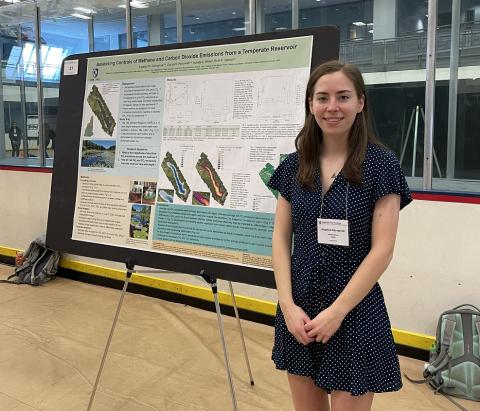Moving on from UNH—A Look Back at Undergraduate Research

As a senior, it’s hard to imagine what will come next after graduation. Some may be looking for a job, others are searching for the right graduate school, and many more may have no idea what their plan is. I spent a lot of time debating what to do next, and in doing so, I looked back on my research experiences at UNH and how they shaped me to be the student that I am today. My research is related to trace gas emissions from wetlands and reservoirs, and I use a lot of the skills that I’ve learned in my marine biology and earth science majors. There are many aspects of my research that I could talk about, but I’ve compiled a list of the three things that stand out to me the most from over the years in hopes of inspiring other undergraduates to get involved in research.
#1: COVID and My First Research Project
I started working on my first Summer Undergraduate Research Fellowship (SURF) proposal during the spring 2020 semester. I remember being so excited to submit the proposal in early March and to finally start doing research, but COVID suddenly shut down the world. The fate of my SURF proposal was in the hands of UNH, and I nervously waited for a response after we were sent home for the rest of the spring semester.
When the decision to transition to a fully online research project was announced, I was crushed. I felt like my research experience was over before it could even begin. Fortunately, I was able to transition my project to be online, and I spent the summer teaching myself R-Coding and sorting through old datasets from my lab. In the end, I was able to get some experience in the lab processing samples, and I presented my work at the URC the next spring. I learned that not everything goes as planned with research and that some things are out of my control, but that I could adapt to the situation and make the most of my experiences.
#2: SURF 2.0 and Summer Field Work
I wrote my first SURF proposal just before the initial COVID lockdown, and funnily enough, I wrote my second SURF proposal while in quarantine at UNH. This time around, UNH gave us the green light to do our research in-person over the 2021 summer. As I geared up for a long field work season, I couldn’t have been more excited to finally do research in the field. Throughout the summer, I collected trace gas and water samples from the Old Durham Reservoir, as well as helped collect gas samples in College Woods and a wetland called Sallie’s Fen.
However, I quickly learned that even if everything is planned out perfectly, there is always something that will go wrong. Whether it was being caught in a thunderstorm in the middle of the woods, collecting samples in 100°F weather in the buggy fen, slipping off the boat into the reservoir, or pulling out a decomposed bird that somehow got into the bubble traps, I realized that anything can happen in field work and that you just have to roll with the punches.
#3: Presenting at AGU
I was able to present at the American Geophysical Union (AGU) Conference in December, 2021 as the culmination of my research experience at UNH. Thanks to funding from the Hamel Center and my mentor, Dr. Ruth Varner, my lab group and I traveled to New Orleans during finals week.
Even though it was incredibly stressful because I had to practice my poster presentation, apply to graduate school, and study for finals all at the same time, I wouldn’t have changed a thing. I now have a much deeper appreciation for the time-intensive work that goes into a research project and presentation. Learning how to interpret data and convey that information to others is a useful skill to have. It was also validating to attend such a prestigious conference as an undergraduate, and I met so many incredible scientists who gave me great advice about projects, posters, and academia. Attending AGU was inspiring, as it pushed me to be a better scientist and it solidified my desire to be a researcher.
As I finish up my last semester at UNH, these three aspects of my research experience—adapting to COVID restrictions, learning firsthand about the highs and lows of field work, and attending my first professional research conference—have allowed me to grow as an individual, a student, and as a researcher. Through my experiences, I learned that I cannot imagine myself doing anything other than research. After applying to several graduate schools, I accepted a master’s position at the University of Georgia, where I will be studying trace gas emissions and marine microbes in salt marsh and deep sea environments.
A high school teacher once told me to never stop asking “why,” and his words have left a lasting impact on me as I continue to seek knowledge about the world. I am forever thankful to Dr. Varner and the Hamel Center for the opportunity to do undergraduate research, as it has catapulted me to new heights that I only dreamed of reaching.